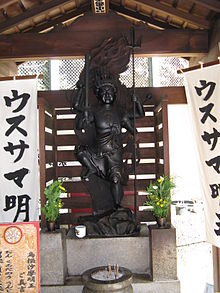Ucchusma
Ucchuṣma (Chinese: 穢跡金剛; pinyin: Huìjì Jīngāng; Rōmaji: Eshaku Kongō) is a Vidyārāja in Mahayana and Vajrayana Buddhism.
Ucchuṣma Vajrapāla (穢跡金剛) soon appeared from amidst the revolving radiance of the Buddha’s heart, and ascended to the celestial palace of the Brahma King.
Known in particular as a scatological, obstetrical, and talismanic god, Ucchuṣma has often been invoked in therapeutic, exorcistic, birth and āveśa, or spirit possession, rituals in imperial China.
Starting from the late Tang period, he gradually increased in popularity outside of his marginal position in maṇḍalas, eventually thriving as an independent protector deity with his own cult.
In the Fujian region of Mainland China as well as Taiwan, Ucchusma is also one of the deities who are regularly invoked by Buddhist adepts and Taoist ritual masters in various ritualistic ceremonies, including rites of exorcism.
[7] In a thirteenth-century Chinese long gāthā elaborating on the two major scriptures relating to Ucchusama, the Huiji Jin’gang Shuo Shentong Daman Tuoluoni Fashu Lingyao Men (穢跡金剛說神通大滿陀羅尼法術靈要 門經; lit "The Scripture of the Numinous and Essential Gate to the Ritual Techniques of the Great Perfection Dhāraṇī of Supernatural Power as Spoken by the Vajra-being of Impure Traces"; T. 1228), and the Huiji Jin’gang Jin Baibian Fajing (穢跡金剛禁百變法經; "The Scripture of the Rites of the Vajra-being of Impure Traces for Binding the Hundred Transformations"; T. 1229), Ucchuṣma’s Chinese name Huìjì Jīngāng was changed to Mìjī Jīngāng due to negative connotations associated with the former name.
In the Chongbian Zhutian Zhuan (重編諸天傳; lit "Recompiled Biographies of Devas and Devīs") from the Southern Song period, one of the Sanskrit transliterations given for Guhyapāda is Ucchuṣma.
